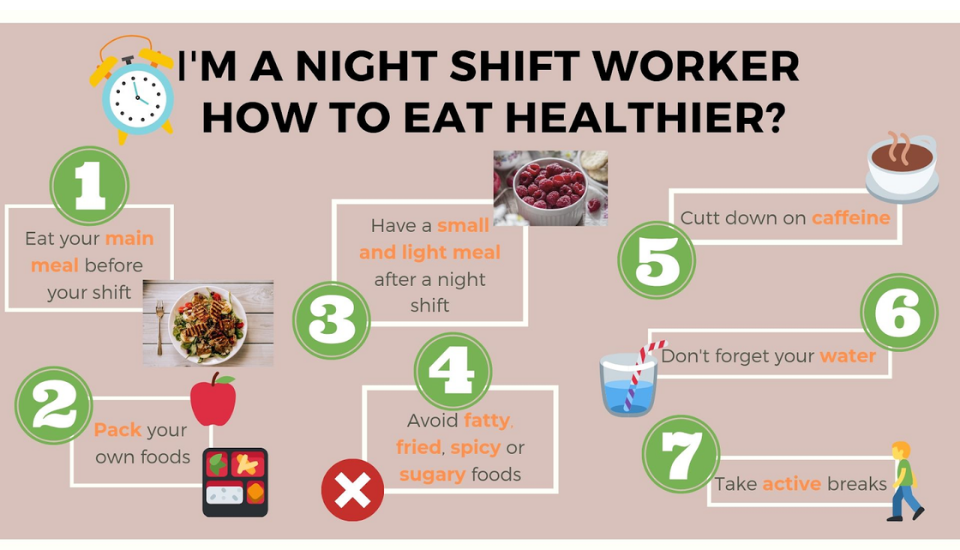Working the night shift can be challenging, especially when it comes to maintaining a healthy diet. Whether you’re a night owl by choice or have been assigned these unusual hours, finding the best way to eat during your shift is crucial for your overall well-being. In this article, we will explore some tips and strategies to help you make nutritious food choices that will keep your energy levels up and promote a good night’s sleep. So, let’s discover the secrets to eating well while working the night shift!

This image is property of www.wholekitchensink.com.
Importance of Proper Nutrition During Night Shift
Working the night shift can have a significant impact on both your sleep patterns and your energy levels. The body’s natural circadian rhythm is disrupted, which can lead to difficulties in falling asleep and staying asleep during the day. One crucial factor that can help mitigate these challenges is maintaining a proper and healthy diet.
Effects of Eating Habits on Sleep and Energy Levels
Your eating habits can directly affect your sleep patterns and energy levels while working the night shift. Consuming heavy and greasy meals can make it harder for your body to digest and can result in indigestion and discomfort throughout the night. On the other hand, skipping meals or relying on unhealthy snacks can lead to drops in energy and decreased cognitive function.
Benefits of a Healthy Diet for Night Shift Workers
Maintaining a healthy diet during the night shift has numerous benefits. Firstly, it can help regulate your sleep patterns by providing the necessary nutrients for your body to function optimally. A balanced diet can also improve your energy levels, allowing you to stay alert and focused throughout your shift. Additionally, a healthy diet can boost your immune system, helping you ward off illnesses and stay healthy in the long run.
Meal Planning and Preparation
When working the night shift, planning your meals in advance becomes crucial. It helps ensure that you have nutritious options available and prevents relying on unhealthy fast food or snacks.
Importance of Planning Meals in Advance
By planning your meals in advance, you can guarantee that you have a variety of nutritious options available. This prevents impulse decisions to grab quick and unhealthy meals due to limited options. Planning also allows you to create a well-balanced plate with the right mix of proteins, carbohydrates, and fats.
Preparation Tips for Night Shift Meals
Preparing meals for the night shift can be done in various ways. Batch cooking is one effective method, where you cook larger portions and divide them into individual meal containers. This allows you to grab a pre-prepared meal and heat it up during your break. Another option is to prepare meals that can be easily assembled on-site, such as salads with pre-chopped veggies and protein sources.
Finding a Balance between Convenience and Nutritional Value
When planning and preparing night shift meals, it’s essential to find a balance between convenience and nutritional value. Opt for meals that can be easily transported and eaten during your break without compromising on the necessary nutrients. This may involve prepping and packing smaller snacks like nuts and fruits, or investing in a good quality lunchbox that keeps your meals fresh and accessible.
This image is property of homey.com.my.
Eating Strategies for Night Shift Workers
In addition to planning and preparing meals, having a strategy for eating during the night shift can further enhance your overall health and energy levels.
Timing of Meals and Snacks
Timing your meals and snacks appropriately can significantly impact your energy levels and sleep quality. Aim to have your main meal before starting your shift, providing your body with the necessary fuel to sustain you throughout the night. Space out small, healthy snacks during your break to avoid feeling overly full or hungry.
Creating a Balanced Plate
When planning your meals, focus on creating a balanced plate. Include a good source of protein, such as lean meats, fish, or plant-based options like tofu or legumes. Add complex carbohydrates like whole grains and starchy vegetables for sustained energy. Lastly, incorporate healthy fats like avocados or nuts to promote satiety and support brain function.
Incorporating Protein, Complex Carbohydrates, and Healthy Fats
Protein is vital for repairing and building tissues, promoting muscle strength, and maintaining a healthy immune system. Complex carbohydrates provide a steady release of energy and can prevent energy slumps during your shift. Healthy fats, such as those found in nuts, seeds, and oily fish, support brain function and can help you feel more satisfied after your meals.
Hydration Strategies for Night Shifts
Staying hydrated is just as important during the night shift as it is during the day. Aim to drink plenty of water throughout your shift to avoid dehydration. Consider keeping a reusable water bottle at your workstation to serve as a visual reminder to stay hydrated. You can also incorporate herbal teas or flavor-infused waters to enhance the taste and make hydration more enjoyable.
Snacking Tips and Ideas
Smart snacking can be a game-changer for night shift workers. It can prevent energy slumps, reduce cravings for unhealthy foods, and keep you fueled throughout your shift.
Choosing Nutritious Snacks
When selecting snacks, opt for nutrient-dense options that provide sustained energy. Choose snacks that combine protein and complex carbohydrates, such as Greek yogurt with berries, or carrot sticks with hummus. These snacks can help stabilize your blood sugar levels and keep hunger at bay.
Avoiding Unhealthy Snacking Habits
It’s important to steer clear of unhealthy snacking habits during the night shift. Avoid reaching for sugary snacks and drinks, as they can provide a quick burst of energy followed by a crash. Also, be mindful of mindless snacking, such as continuously munching on chips or cookies while working.
Snack Ideas for Night Shifts
Here are some snack ideas that are both nutritious and delicious for night shift workers:
- Apple slices with almond butter
- Mixed nuts and dried fruits
- Baby carrots with homemade hummus
- Hard-boiled eggs
- Whole grain crackers with cheese
- Trail mix with a variety of nuts and seeds

This image is property of colleenchristensennutrition.com.
Maintaining Energy and Combatting Fatigue
Night shift work can be physically and mentally demanding, often leading to fatigue and decreased energy levels. Proper fueling throughout your shift can help combat these challenges.
Importance of Proper Fueling
Proper fueling is essential for night shift workers to maintain optimum energy levels. By consuming a balanced diet and incorporating nutrient-dense foods, you provide your body with the necessary fuel to sustain you throughout your shift.
Foods That Provide Sustainable Energy
Certain foods are known to provide sustainable energy and combat fatigue. Incorporate complex carbohydrates like whole grains and sweet potatoes into your meals, as they release energy slowly and keep you feeling energized for longer periods. Lean proteins, such as chicken, fish, or tofu, can also help boost energy levels and prevent muscle fatigue.
Tips for Avoiding Energy Slumps during Night Shifts
To avoid energy slumps during your night shift, try the following tips:
- Take short breaks to stretch and move around.
- Incorporate physical activity during your off-shift hours to boost energy levels.
- Practice deep breathing exercises to increase oxygen intake and alertness.
- Limit the consumption of caffeine and sugary drinks, as they can result in energy crashes later on.
Navigating Sleep and Meal Schedule
Working the night shift can significantly disrupt your sleep schedule. Establishing a consistent sleep routine and aligning your meal times with your circadian rhythm can help promote better sleep and digestive health.
Establishing a Consistent Sleep Routine
Try to establish a consistent sleep routine by going to bed and waking up at the same time every day. This helps regulate your internal body clock and can make falling asleep and staying asleep during the day easier.
Aligning Meal Times With Circadian Rhythm
Aligning your meal times with your circadian rhythm can optimize your digestion and promote better sleep. Plan to have your main meal before or shortly after starting your shift, as this is when your body is primed for digestion. Avoid heavy meals close to bedtime, as they can cause discomfort and disrupt your sleep.
Avoiding Heavy Meals Before Sleep
If you find it challenging to fall asleep after your night shift, avoid consuming heavy meals shortly before bedtime. Opt for lighter options like a small snack or a light meal that includes lean protein and vegetables. This can help prevent indigestion and promote a more restful sleep.

This image is property of www.hprc-online.org.
Mindful Eating and Mindset
Practicing mindful eating can enhance your overall experience with food and promote a positive relationship with what you consume.
Taking Time to Enjoy Meals
During your night shift breaks, take the time to sit down and enjoy your meals. Avoid eating on the go or while multitasking, as this can lead to mindless overeating or indigestion. Savor each bite and focus on the flavors and textures of your food.
Avoiding Mindless Eating Habits
Mindless eating habits, such as snacking out of boredom or stress, can easily develop during the night shift. Pay attention to your hunger cues and eat when genuinely hungry, rather than allowing external factors to dictate your food choices.
Promoting a Positive Relationship with Food
Shift work can sometimes make it challenging to prioritize healthful eating habits. However, by viewing food as fuel for your body and prioritizing nutritious choices, you can foster a positive relationship with food. Remember that making conscientious choices and nourishing your body with the right nutrients will ultimately support your overall well-being and performance during the night shift.
Supplementation and Vitamin D
As a night shift worker, your exposure to natural sunlight is limited, which can affect your vitamin D levels. Supplementation may be necessary to maintain adequate vitamin D levels and support your overall health.
Importance of Adequate Vitamin D Levels
Vitamin D plays a crucial role in maintaining optimal health, including supporting the immune system, bone health, mood regulation, and energy levels. As night shift workers may have limited exposure to natural light, ensuring adequate vitamin D levels becomes even more important.
Supplements for Night Shift Workers
Consulting with a healthcare professional is recommended to determine the appropriate vitamin D supplementation for your specific needs. They can assess your current vitamin D levels and provide guidance on the dosage and type of supplements to take.
Consulting with a Healthcare Professional
When considering supplementation, it is always essential to consult with a healthcare professional. They can provide personalized advice based on your specific health needs and concerns. They can also ensure that any supplements you take do not interfere with any medications or pre-existing conditions you may have.
This image is property of qph.cf2.quoracdn.net.
Healthy Lifestyle Habits for Night Shift Workers
In addition to proper nutrition, incorporating other healthy lifestyle habits can further support your well-being as a night shift worker.
Regular Exercise Routine
Regular exercise is a fantastic way to boost your energy levels, reduce stress, and improve overall health. Incorporate physical activity into your routine, whether it’s before or after your night shift. Aim for a combination of cardiovascular exercise, strength training, and flexibility exercises to reap the full benefits.
Stress Management Techniques
Working the night shift can sometimes be stressful, and finding effective ways to manage stress is crucial for your overall well-being. Explore different techniques such as deep breathing exercises, meditation, yoga, or engaging in hobbies that bring you joy. Find what works best for you and make it a priority to incorporate stress-relieving practices into your routine.
Seeking Social Support
Navigating the night shift can sometimes be challenging, and seeking social support from friends, family, or colleagues who understand your unique schedule can be incredibly helpful. Find a support system that you can connect with, whether it’s through in-person or virtual interactions, as they can provide encouragement and understanding during the ups and downs of working the night shift.
Conclusion
Maintaining proper nutrition during the night shift is essential for sleep, energy levels, and overall well-being. By following meal planning and preparation strategies, incorporating healthy eating habits such as mindful eating and proper fueling, and considering vitamin D supplementation, night shift workers can optimize their health and performance. Additionally, incorporating other healthy lifestyle habits such as regular exercise, stress management, and seeking social support can further enhance the overall experience of working the night shift. Remember to consult with a healthcare professional to tailor these recommendations specifically to your needs and circumstances. Embrace the importance of proper nutrition during the night shift, and you’ll be well on your way to thriving in this unique work schedule.

